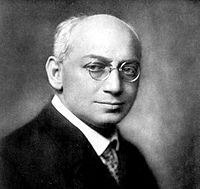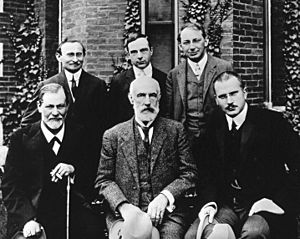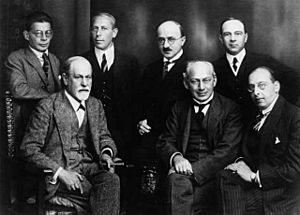Sándor Ferenczi facts for kids
Quick facts for kids
Sándor Ferenczi
|
|
|---|---|
 |
|
| Born |
Sándor Fränkel
7 July 1873 |
| Died | 22 May 1933 (aged 59) |
| Known for | Budapest School of Psychoanalysis, identification with the aggressor, regressus ad uterum |
| Scientific career | |
| Fields | Psychoanalysis |
| Institutions | International Psychoanalytical Association (president) Hungarian Psychoanalytical Society (founder) |
| Influences | Sigmund Freud |
| Influenced | Mihály Bálint, Alice Bálint, Imre Hermann, Sigmund Freud, Otto Rank, Mária Török, Nicolas Abraham, Melanie Klein |
Sándor Ferenczi (born July 7, 1873 – died May 22, 1933) was a Hungarian psychoanalyst. He was a very important thinker in the field of psychoanalysis and worked closely with Sigmund Freud, who is often called the "father of psychoanalysis."
Contents
About Sándor Ferenczi

Sándor Ferenczi was born Sándor Fränkel. His parents were Baruch Fränkel and Rosa Eibenschütz. Later, he changed his last name to Ferenczi, which is a Hungarian way of saying it.
Ferenczi was special because he worked with patients who had very difficult problems. He also believed in a more active way of helping people in therapy. In the early 1920s, he worked with Otto Rank to create a "here-and-now" therapy. This approach focused on what was happening with the patient right at that moment. This idea later influenced Carl Rogers and his person-centered therapy in America.
Today, many modern psychoanalysts like Ferenczi's ideas. They see him as someone who understood the importance of how the therapist and patient connect. He thought it was important for the therapist to understand their own feelings too. Ferenczi was also the president of the International Psychoanalytical Association from 1918 to 1919.
Near the end of his life, Ferenczi became very ill with a disease called pernicious anemia. This disease was untreatable at the time. Even though he was very sick, he gave an important speech called "Confusion of Tongues" in 1932. He passed away in 1933. His work and ideas became more recognized again after a book about him was published in 2002.
Ferenczi's Big Ideas
Being Active in Therapy
Ferenczi believed that therapists should be more active in helping their patients. Unlike some who thought therapists should mostly listen, Ferenczi would sometimes guide patients. He did this to help them bring out hidden thoughts and feelings. For example, he once helped an opera singer with stage fright. He asked her to "perform" during a therapy session. This helped her face and work through her fears.
Empathy in Therapy
Ferenczi thought that understanding and sharing feelings (empathy) was key in therapy. He believed that therapists should really try to understand what the patient was feeling. Instead of just being like a doctor giving medicine, Ferenczi wanted the patient and therapist to work together. He also thought it was okay for therapists to share some of their own thoughts or experiences if it helped the patient. This was different from the idea that therapists should always stay neutral. This idea of a "mutual encounter" helped create the idea of "two-person psychology" in therapy.
The "Confusion of Tongues" Idea
Ferenczi believed that difficult experiences in childhood could cause problems later in life. These experiences could be things like not getting enough emotional support or feeling misunderstood. He called one of his ideas the "confusion of tongues." This idea suggests that sometimes adults might misunderstand a child's needs or feelings. This misunderstanding can be very upsetting for the child and lead to lasting emotional pain.

See also
 In Spanish: Sándor Ferenczi para niños
In Spanish: Sándor Ferenczi para niños
- Amphimixis
- Identification with the aggressor
- Little Arpad
- Otto Rank
 | John T. Biggers |
 | Thomas Blackshear |
 | Mark Bradford |
 | Beverly Buchanan |

